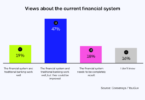Today IOSCO – the International Organization of Securities Commissions – published a report on Decentralized Finance (DeFi) which identifies some novel DeFI services but questions whether many DeFi markets are entirely peer to peer (P2P) with no centralized control. It also notes that blockchain DeFi services are often similar to traditional finance (TradFi) services but “with weaker regulation and increased risks for investors.”
In light of the report, it is setting up a new task force headed by Tuang Lee Lim, the Assistant Managing Director of the Monetary Authority of Singapore (MAS). “The report provides evidence of both the potential opportunities as well as significant risks that DeFi can bring to investors and markets,” said Mr Lim.
As an example, the disintermediation enabled through DeFi can save significant costs. But the report authors note that some of these intermediaries provide roles as gatekeepers, for investor protection to help investors understand risks, and helping to minimize fraud.
In DeFi, some projects fail to provide appropriate disclosures, and misinformation on social media is widespread. The net result is investors are often not capable of making informed decisions based on the limited or inaccurate information available.
It also notes that sometimes capital raising using DAOs and governance tokens enables founders to make a profit early on at the expense of retail investors, particularly if the project fails. With founders holding significant allocations of these governance tokens, this also undermines the potential for projects to become decentralized.
There are aother risks well-known in DeFi and blockchain. One is the concept of front running, where blockchain validators get to see transactions before they are processed and have an opportunity to insert their own trades first. It’s known as miners extracted value or MEV. Enterprise blockchain firm R3 is looking to deploy its Conclave privacy solution onto the public Ethereum blockchain to address this risk.
One feature which is often viewed as an attractive innovation by the DeFi community is flash loans. This is an instantaneous loan that is bundled with a transaction atomically. Money is borrowed, a transaction is executed and the money is repaid, all as part of a single transaction. Because of this atomicity, traders can borrow large sums without collateral. IOSCO notes that the problem arises if there is some kind of coding error in one of the protocols. Flash loans make exploiting these vulnerabilities far easier.
These are just a few of the many points raised in the report. IOSCO is looking for feedback, including from players in the DeFi sector.
IOSCO is also playing a major role in the international regulation of stablecoins. Last year it published a report on the topic in conjunction with the BIS.






